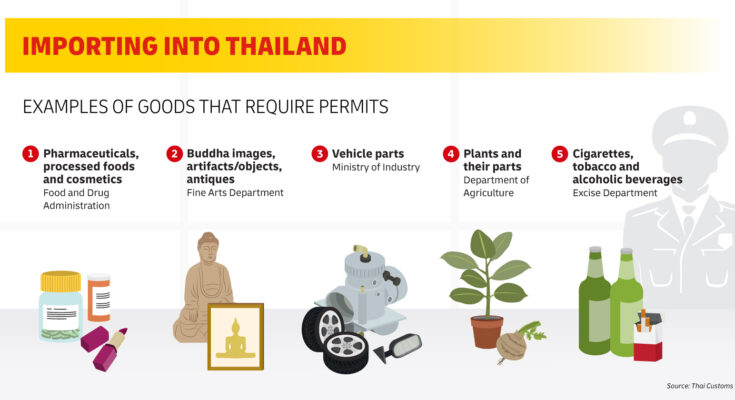There are 3 main components to comply with before you can legally import / export things into Thailand.
#1. You’ll need to incorporate a VAT registered company in Thailand
#2. You’ll need to apply for a general Import/Export License (usually valid for 3 years)
#3. For most items that you may be interested in importing or exporting, it may require a specific Import/Export Permit for the products.
The Thai Ministry of Commerce divides the goods into about 50 different families that require specific licenses to import. Many products are subject to other controls from other laws. These include:
- The importation of processed foods, medical devices, vitamins, cosmetics and pharmaceutical products (medicines) requires a Food and Drug Administration authorization from the Ministry of Health.
- The trade in minerals is subject to a strict rule: without the appropriate authorization, it is prohibited to import more than two kilograms of tungsten oxide and tin ores and metallic tin.
- Antiques, works of art, museum and historical exhibits may not be shipped without authorization from the Director General of Fine Arts
- Weapons, ammunition, explosives, fireworks and prohibited firearms are prohibited from the production, purchase, use or import unless they have the appropriate license Of the Ministry of the Interior.
- Alcohol, Cigarettes and Tobacco products must obtain permission from the Excise Department
General overview of the whole import / export process in Thailand
*Please note that to get licenses, you must apply under a company name, an individual is not eligible, except for some cases.
Step 1 – Fill an official declaration:
You can fill the Customs Form 99 or 99/1 manually or via the e-Customs system.
Step 2 – Provide supporting official documents:
– Cargo report or air waybill (air freight)or bill of lading (sea freight)
– 3 copies of the invoice
– Packing list
– Insurance mentioned on the invoice
– Release form (customs form 100/1 or 469)
– Foreign transaction form if the import value exceeds 500 000 Baht
– Import license (if applicable)
– Certificates of Origin (if applicable)
– Other relevant documents such as catalogs, product specifications, etc.
Step 3 – Submit the Customs Statement and Support Documents:
Once at the port of entry, you must provide the Declaration of Importation and the supporting documents so that they are checked by the customs.
The customs authorities will ensure that the documents are completed and that there is no missing supporting document attached. The authorities will also control the customs tariff, the calculation of duties and taxes and the valuation of goods.
Step 4 – Pay the applicable import duties and taxes using one of these methods:
– Payment to the Customs Department
– Electronic Funds Transfer via BOT’s BAHTNET
– Electronic payment to Krung Thai Bank
– Electronic Funds Transfer (EFT) via EDI
Step 5 – Inspect and release customs cargo:
The imported goods will then be inspected by customs inspectors. The inspected parcel must correspond to the declaration submitted by the importer so that the customs inspectors validate and register the computer control and then release the goods to the importer.
If you are interested to start an import/export business, feel free to reach out to our Market Entry experts who can assist you with your Company Set Up, Acquiring an Import/Export License for your Company and apply for the necessary import permit.
Line us: https://lin.ee/QUvqnS
WhatsApp us: https://wa.me/66620155533
Send us an email: sales@unionspace.co.th



